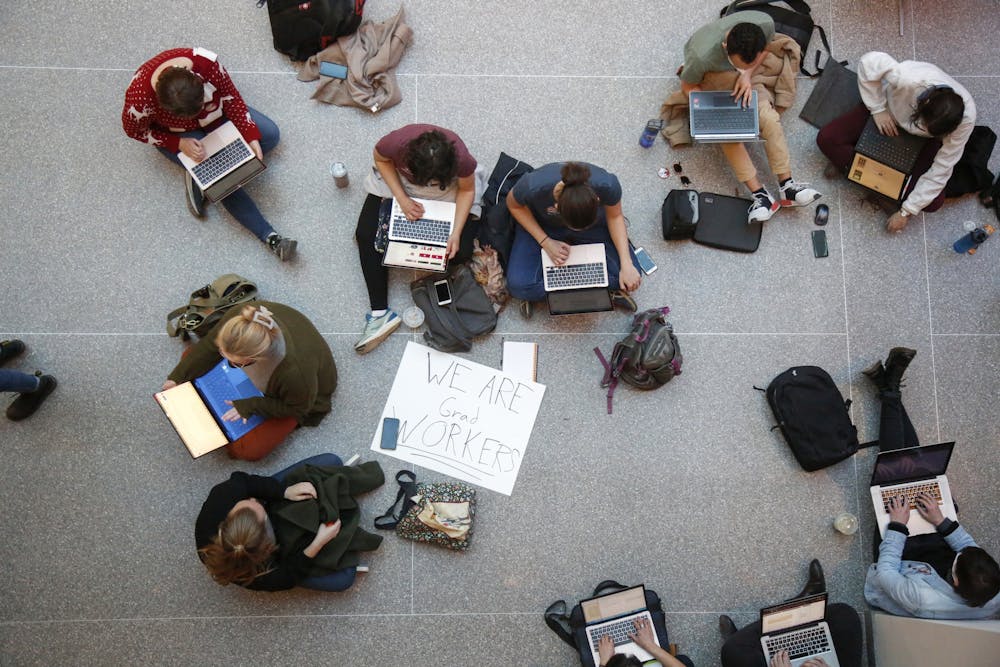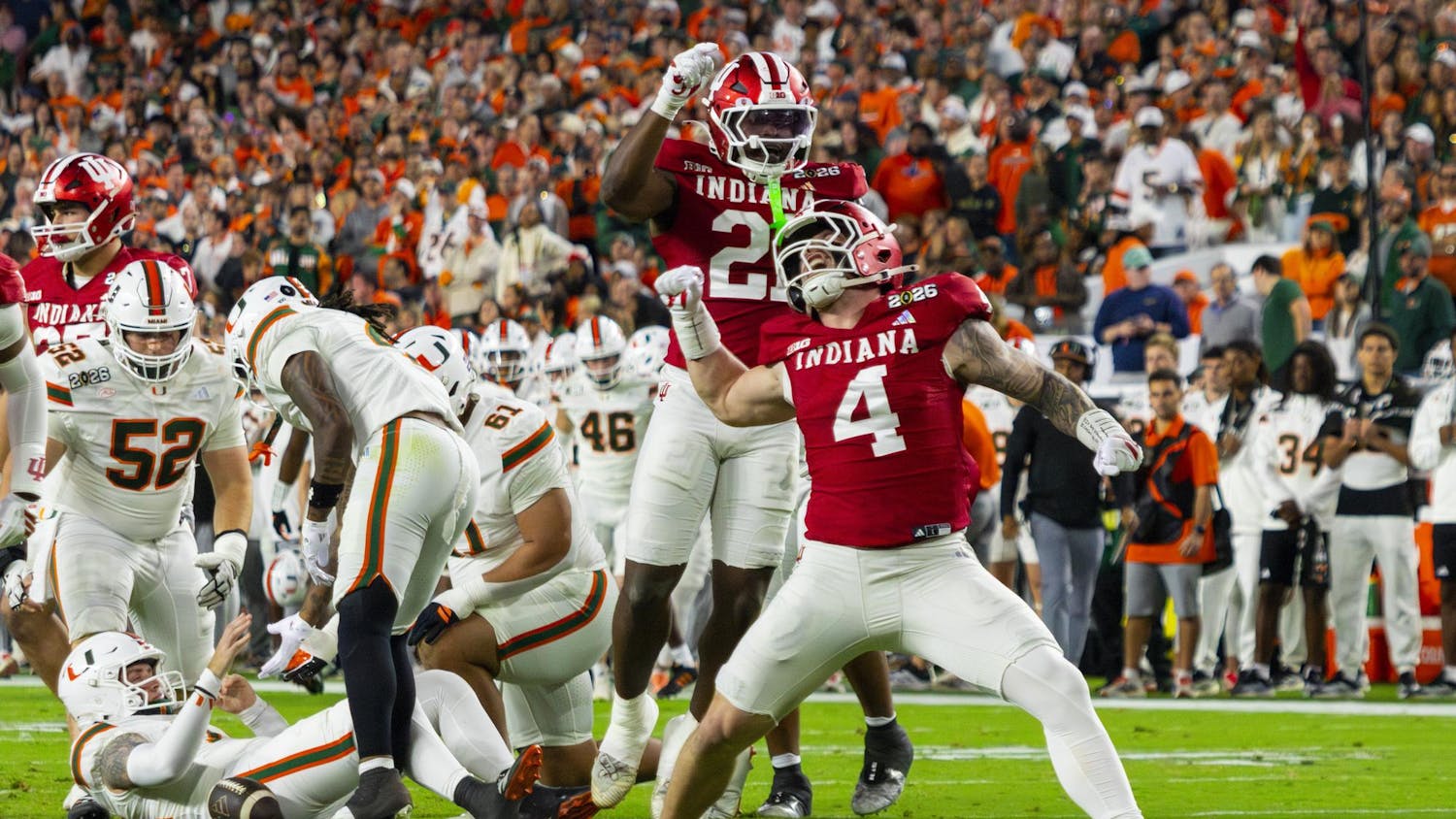Graduate workers at IU-Bloomington will see their stipends increase by at least 5% next year.
Campus leadership committed to a new minimum rate of compensation and expanded graduate workers’ ability to use tuition remission to cover classes outside of their academic unit or school.
These commitments come as the Indiana Graduate Workers Coalition-United Electrical Workers, which seeks to represent graduate workers as a labor union, is considering a strike if the administration doesn’t grant them a path toward union recognition.
IGWC-UE organizer and spokesperson Cole Nelson said the announced stipend increases have not derailed the conversation about a strike.
“Having zero communication regarding the process towards unionization, and then a 5% salary raise–or stipend raise–just means that the administration has no intention of recognizing the demands of graduate workers,” he said.
The increases were announced to College of Arts and Sciences graduate students March 28, in an email from the College’s Executive Dean Rick Van Kooten. The message was described in the subject line as a memo from the Provost.
But a previous draft of the memo, described by Van Kooten at a March 25 Chairs and Directors Meeting, included none of those announcements.
IU spokesperson Chuck Carney said most announcements regarding university policy go through revisions, but couldn’t speak to the specifics of the provost’s memo.
The draft Van Kooten described instead included a list of possible consequences to the academic appointments of graduate workers that decide to strike, including termination, suspension with or without pay, and non-reappointment, attendees of the meeting said.
In response, a number of faculty members in the meeting made it clear they would not be willing to collect or compile the names of striking graduate workers to enforce such consequences. Some suggested the contents of the memo could be interpreted as an escalation on the part of graduate students considering a strike.
Related: [Grad workers denied union election, say fight for collective bargaining continues]
According to a press release issued by the IGWC-UE on March 28, before the stipend increases were announced, more than 500 graduate workers had pledged to join a strike in the event that the coalition authorizes it. Nelson said before the coalition pursues a strike, it would have to pass an authorization vote.
Tuesday, the coalition’s strike fund posted on GoFundMe was less than $100 short of reaching its goal of $10,000. The description specifies that donations would go to cover legal fees or unforeseen hardships for strikers and their families.
Graduate workers have been protesting against mandatory student fees, which they say eat into their already modest stipends, since 2017. The coalition formed in 2019, set their sights on unionization following last spring’s fee strike and affiliated with United Electrical Workers over the summer.
According to the IGWC-UE’s website, their current goals include eliminating the fees and securing a living wage with annual raises and fair and protected benefits. They also call for a formalized grievance procedure and fairness for international students, who pay higher fees than domestic students. The organization sees collective bargaining as a way to achieve these objectives.
Graduate workers have begun discussing the possibility of a strike with faculty and leadership in their departments and asking for commitments to non-retaliation, Nelson said. Several departments, including English and math, have made statements affirming that they won’t penalize graduate students who decide to strike. As of Tuesday, more than 350 faculty members had signed a pledge of neutrality drafted by the IGWC-UE.
Nelson said the announcements have strengthened the convictions of some members of the coalition.
“As experienced union organizers have said in the past, the best organizer is the boss,” he said. “It really does seem like the concessions from Monday have increased strike participation, and increased support for unionization.”
Since the increases were announced on March 28, Nelson said the coalition has continued to receive signed strike pledges, bringing the total to more than 850 as of Tuesday.
“We would prefer to avoid a strike,” Carney said. “But our job is to address the issues that are being brought up, and that's what we're trying to do.”
Nelson sees the announced increases as a direct result of the proposed strike.
“There is not an ounce of coincidence in that timing, to my eye at least,” he said.
Benjamin Robinson, the chair of the Germanic Studies Department and president of IU-Bloomington’s chapter of American Association of University Professors, agrees.
“The announcement acknowledges the power of the union already,” he said.
Robinson has added his name to a faculty petition calling on IU Provost Rahul Shrivastav and IU President Pamela Whitten to meet with representatives of the IGWC-UE.
“Why not?” he said. “I think all the signatories of it believe that process and dialogue is better than blanket refusal and intransigence.”
Representatives of the IGWC-UE have regularly requested an official dialogue between campus administrators and their organization. While that has not yet happened, university officials point to efforts to engage with individual students, who may be members of the coalition, through open forums and regular meetings with the Graduate and Professional Student Government.
Robinson says offering the raises was the right thing to do, but doesn’t go far enough. Citing a Bureau of Labor Statistics report, he noted that the 5% increase is smaller than the past year’s 7.9% rise in the price of consumer goods.
“It's in many ways too little too late,” he said.
The March 28 memo to graduate students in the College of Arts and Sciences gives credit to the “insightful comments” generated during recent listening sessions. The events were intended to give graduate students an opportunity to voice their concerns to a panel of College and campus leadership, including Dean Van Kooten and Provost Shrivastav.
During a listening session held Feb. 23, a number of attendees pressed the panelists for direct dialogue with representatives of the IGWC-UE and a path toward union recognition. The administrators attempted to refocus the conversation on specific issues, such as workload or health insurance plans.
“I’m very interested in meeting graduate students and trying to understand your problems and find ways to solve them,” Provost Shrivastav said, then in his second week on the job.
But when pushed for a commitment to meet with IGWC-UE representatives, he referred to a Feb. 1 letter from his predecessor, John Applegate, rejecting the IGWC-UE’s bid for a union election.
“At this point, I’m still learning, but I don’t see any particular reason to revisit that issue,” he said.
Earlier that month, GPSG passed a resolution in support of unionization with a 60 to 0 vote.
At a March 3 listening session, Dean Van Kooten rejected the idea that union bargaining is the only way to create changes, highlighting progress made toward implementing the recommendations from a 2019 report issued by the College of Arts and Sciences Task Force on Graduate Student Funding.
The College has waived one category of fees for graduate workers, effectively increasing their take-home pay by $1,100 a year and has made progress toward raising all stipends in the College to a minimum of $18,000, though stipends in some departments still lagged behind before Monday’s announcement.
"It's unfair to say we haven't done anything, the college has done things the past few years. We have to do more. Making a union doesn't create money,” said Dean Van Kooten.
Several attendees said they recognized that the College was doing the best they could with limited resources, and suggested a union would allow them to bargain at the campus level to reallocate funds to their departments to increase stipends.
Under IU’s current budget model, each academic unit — such as the College of Arts and Sciences or the Kelley School of Business — is largely responsible for its own finances. Revenue generated mainly by enrollment is used to cover costs like faculty wages. Academic units also pay a tax back to the campus to cover operating expenses such as physical space, utilities and some administrative services.
Within this model, each academic unit funds its own graduate students. The vast majority of graduate workers receiving stipends are in the College of Arts and Sciences.
David McDonald, the chair of the Folklore and Ethnomusicology department, described a flurry of emails between various chairs and directors following the announcement.
The department heads asked questions about where the money would be found after the administration had said for years that they were not able to fund such increases, he said.
Carney could not provide an immediate answer as to where the funding for the increases would come from, but gave assurances that the campus would provide financial support to the academic units if they were not able to come up with the funding on their own.
“At the department level, we’re strapped,” Germanic Studies Chair Benjamin Robinson said. “What we need is bold decisions at the top to reallocate funding.”
During the March 25 chairs and directors meeting Dean Van Kooten said it would cost $6-8 million in base funding to raise stipends at IU to the median of those at other Big 10 universities, said Chairs Robinson and McDonald.
While Carney could not immediately provide an answer as to the total price tag of the increases, the figure is certainly well under $6 million.
“In a public university, there is very little extra money just to splurge,” Provost Shrivastav said during the March 3 listening session. “Every decision is a trade-off between, usually, two good choices.”
Robinson said a university’s budget priorities should reflect its values.
“Of course, all budgeting is about operating under constraints, but the fact is you can make bold decisions,” Robinson said, pointing to a recent pledge from the University of Missouri to allocate $500 million to raises for faculty and staff.
According to a press release from the University of Missouri, the investments will be funded by a mix of new and existing resources.
Robinson said he sees support of graduate students’ unionization efforts as an extension of the American Association of University Professors' mission to advocate for academic freedom and shared governance. He described the graduate worker’s push for a union not merely as a means to redress grievances, but to uphold a “collegial ideal” of transparency in decision-making.
IU’s graduate students are not alone in the campaign for unionization.
As the Guardian reports, the IGWC-UE is joining a wave of graduate labor organizing at American universities.
At the February listening session Luke Rylander, an associate instructor and GPSG representative, described the motivation of graduate students seeking union recognition.
“When it comes to the topic of unionization, we're not necessarily solely interested in results,” he said. “We're asking for unionization because we are interested in becoming a part of the process of decision-making.”
Rylander was interrupted by a wave of applause before continuing to address the administrators.
“If you offered us the ideal package that fits all of our problems, I think we would still be disgruntled and unsatisfied with that if we cannot have a guaranteed seat at the table,” he said.
CORRECTION: A previous version of this article misstated the publication date of John Applegate’s letter.




